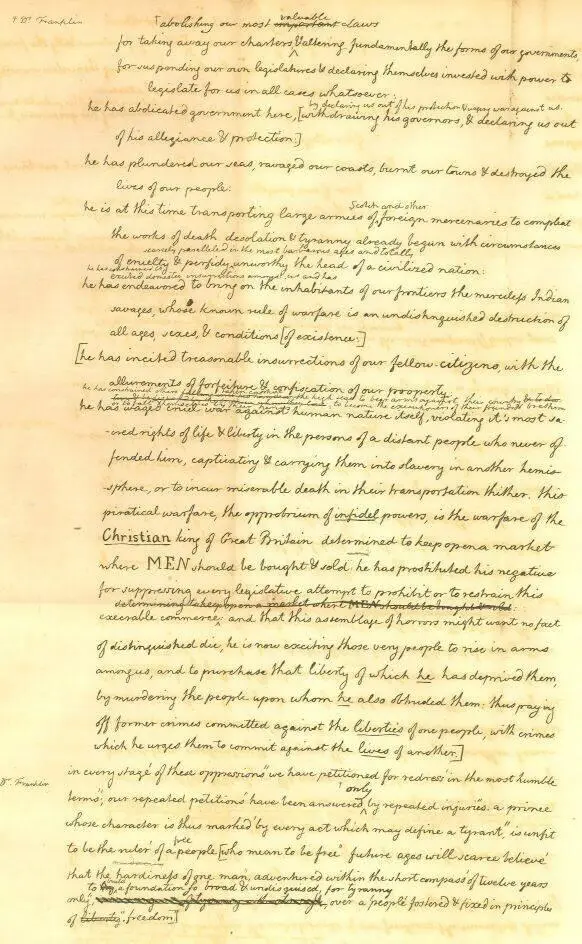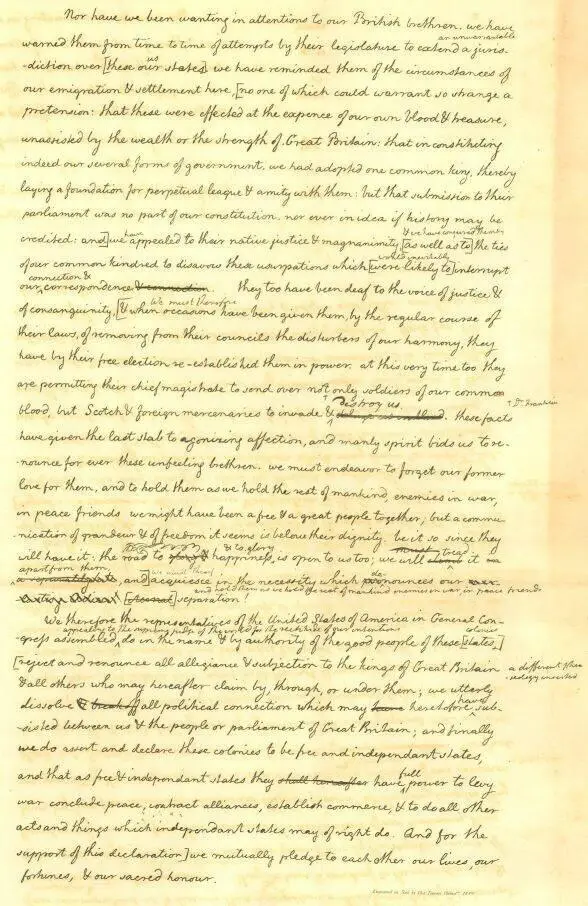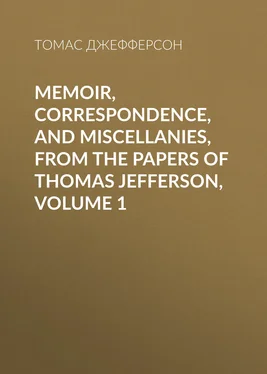Томас Джефферсон - Memoir, Correspondence, And Miscellanies, From The Papers Of Thomas Jefferson, Volume 1
Здесь есть возможность читать онлайн «Томас Джефферсон - Memoir, Correspondence, And Miscellanies, From The Papers Of Thomas Jefferson, Volume 1» — ознакомительный отрывок электронной книги совершенно бесплатно, а после прочтения отрывка купить полную версию. В некоторых случаях можно слушать аудио, скачать через торрент в формате fb2 и присутствует краткое содержание. Жанр: foreign_prose, История, foreign_edu, foreign_antique, на английском языке. Описание произведения, (предисловие) а так же отзывы посетителей доступны на портале библиотеки ЛибКат.
- Название:Memoir, Correspondence, And Miscellanies, From The Papers Of Thomas Jefferson, Volume 1
- Автор:
- Жанр:
- Год:неизвестен
- ISBN:нет данных
- Рейтинг книги:4 / 5. Голосов: 1
-
Избранное:Добавить в избранное
- Отзывы:
-
Ваша оценка:
- 80
- 1
- 2
- 3
- 4
- 5
Memoir, Correspondence, And Miscellanies, From The Papers Of Thomas Jefferson, Volume 1: краткое содержание, описание и аннотация
Предлагаем к чтению аннотацию, описание, краткое содержание или предисловие (зависит от того, что написал сам автор книги «Memoir, Correspondence, And Miscellanies, From The Papers Of Thomas Jefferson, Volume 1»). Если вы не нашли необходимую информацию о книге — напишите в комментариях, мы постараемся отыскать её.
Memoir, Correspondence, And Miscellanies, From The Papers Of Thomas Jefferson, Volume 1 — читать онлайн ознакомительный отрывок
Ниже представлен текст книги, разбитый по страницам. Система сохранения места последней прочитанной страницы, позволяет с удобством читать онлайн бесплатно книгу «Memoir, Correspondence, And Miscellanies, From The Papers Of Thomas Jefferson, Volume 1», без необходимости каждый раз заново искать на чём Вы остановились. Поставьте закладку, и сможете в любой момент перейти на страницу, на которой закончили чтение.
Интервал:
Закладка:
And for the support of this declaration, we mutually pledge to each other our lives, our fortunes, and our sacred honor. ]
(We therefore the representatives of the United States of America in General Congress assembled, appealing to the supreme judge of the world for the rectitude of our intentions, do in the name, and by the authority of the good people of these colonies, solemnly publish and declare, that these united colonies are, and of right ought to be, free and independent states; that they are absolved from all allegiance to the British crown, and that all political connection between them and the state of Great Britain is, and ought to be, totally dissolved; and that as free and independent states, they have full power to levy war, conclude peace, contract alliances, establish commerce, and to do all other acts and things which independent states may of right do.
And for the support of this declaration, with a firm reliance on the protection of divine providence, we mutually pledge to each other our lives, our fortunes, and our sacred honor.)
The declaration thus signed on the 4th, on paper, was engrossed on parchment, and signed again on the 2nd of August.
[ 8 8 The above note of the author is on a slip of paper, pasted in at the end of the Declaration. Here is also sewed into the MS. a slip of newspaper containing, under the head ‘Declaration of Independence,’ a letter from Thomas Mc’Kean to Messrs. William M’Corkle & Son, dated ‘Philadelphia, June 16 1817.’ This letter is to be found in the Port Folio, Sept. 1817, p. 249.
Some erroneous statements of the proceedings on the Declaration of Independence having got before the public in latter times, Mr. Samuel A. Wells asked explanations of me, which are given in my letter to him of May 12, ‘19, before and now again referred to. (See Appendix, note B.) I took notes in my place while these things were going on, and at their close wrote them out in form and with correctness, and from 1 to 7 of the two preceding sheets, are the originals then written; as the two following are of the earlier debates on the Confederation, which I took in like manner.]
ENLARGE
ENLARGE
ENLARGE

ENLARGE

On Friday, July 12, the committee appointed to draw the articles of Confederation reported them, and on the 22nd, the House resolved themselves into a committee to take them into consideration. On the 30th and 31st of that month, and 1st of the ensuing, those articles were debated which determined the proportion, or quota, of money which each state should furnish to the common treasury, and the manner of voting in Congress. The first of these articles was expressed in the original draught in these words. ‘Art. XI. All charges of war and all other expenses that shall be incurred for the common defence, or general welfare, and allowed by the United States assembled, shall be defrayed out of a common treasury, which shall be supplied by the several colonies in proportion to the number of inhabitants of every age, sex, and quality, except Indians not paying taxes, in each colony, a true account-of which, distinguishing the white inhabitants, shall be triennially taken and transmitted to the Assembly of the United States.’
Mr. Chase moved that the quotas should be fixed, not by the number of inhabitants of every condition, but by that of the ‘white inhabitants.’ He admitted that taxation should be always in proportion to property; that this was, in theory, the true rule; but that, from a variety of difficulties, it was a rule which could never be adopted in practice. The value of the property in every state, could never be estimated justly and equally. Some other measures for the wealth of the state must therefore be devised, some standard referred to, which would be more simple. He considered the number of inhabitants as a tolerably good criterion of property, and that this might always be obtained. He therefore thought it the best mode which we could adopt, with one exception only: he observed that negroes are property, and as such, cannot be distinguished from the lands or personalities held in those states where there are few slaves; that the surplus of profit which a Northern farmer is able to lay by, he invests in cattle, horses, &c. whereas a Southern farmer lays out the same surplus in slaves. There is no more reason therefore for taxing the Southern states on the farmer’s head, and on his slave’s head, than the Northern ones on their farmers’ heads and the heads of their cattle: that the method proposed would, therefore, tax the Southern states according to their numbers and their wealth conjunctly, while the Northern would be taxed on numbers only; that negroes, in fact, should not be considered as members of the state, more than cattle, and that they have no more interest in it.
Mr. John Adams observed, that the numbers of people were taken by this article, as an index of the wealth of the state, and not as subjects of taxation; that, as to this matter, it was of no consequence by what name you called your people, whether by that of freemen or of slaves; that in some countries the laboring poor were called freemen, in others they were called slaves; but that the difference as to the state was imaginary only. What matters it whether a landlord employing ten laborers on his farm, give them annually as much money as will buy them the necessaries of life, or gives them those necessaries at short hand? The ten laborers add as much wealth annually to the state, increase its exports as much, in the one case as the other. Certainly five hundred freemen produce no more profits, no greater surplus for the payment of taxes, than five hundred slaves. Therefore the state in which are the laborers called freemen, should be taxed no more than that in which are those called slaves. Suppose, by an extraordinary operation of nature or of law, one half the laborers of a state could in the course of one night be transformed into slaves; would the state be made the poorer or the less able to pay taxes? That the condition of the laboring poor in most countries, that of the fishermen particularly of the Northern states, is as abject as that of slaves. It is the number of laborers which produces the surplus for taxation, and numbers, therefore, indiscriminately, are the fair index of wealth; that it is the use of the word ‘property’ here, and its application to some of the people of the state, which produces the fallacy. How does the Southern farmer procure slaves? Either by importation or by purchase from his neighbor. If he imports a slave, he adds one to the number of laborers in his country, and proportionably to its profits and abilities to pay-taxes; if he buys from his neighbor, it is only a transfer of a laborer from one farm to another, which does not change the annual produce of the state, and therefore should not change its tax: that if a Northern farmer works ten laborers on his farm, he can, it is true, invest the surplus of ten men’s labor in cattle; but so may the Southern farmer, working ten slaves; that a state of one hundred thousand freemen can maintain no more cattle, than one of one hundred thousand slaves. Therefore, they have no more of that kind of property; that a slave may, indeed, from the custom of speech, be more properly called the wealth of his master, than the free laborer might be called the wealth of his employer: but as to the state, both were equally its wealth, and should therefore equally add to the quota of its tax.
Читать дальшеИнтервал:
Закладка:
Похожие книги на «Memoir, Correspondence, And Miscellanies, From The Papers Of Thomas Jefferson, Volume 1»
Представляем Вашему вниманию похожие книги на «Memoir, Correspondence, And Miscellanies, From The Papers Of Thomas Jefferson, Volume 1» списком для выбора. Мы отобрали схожую по названию и смыслу литературу в надежде предоставить читателям больше вариантов отыскать новые, интересные, ещё непрочитанные произведения.
Обсуждение, отзывы о книге «Memoir, Correspondence, And Miscellanies, From The Papers Of Thomas Jefferson, Volume 1» и просто собственные мнения читателей. Оставьте ваши комментарии, напишите, что Вы думаете о произведении, его смысле или главных героях. Укажите что конкретно понравилось, а что нет, и почему Вы так считаете.












